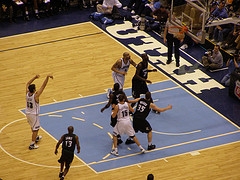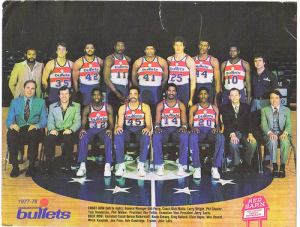The National Basketball Association season has just gotten underway (ok, so it has been about 2 weeks, I've been busy plotting a HRevolution), and to prepare I was reading the NBA season preview in Sports Illustrated. The best part of the season preview is the small section on each team's page where the magazine prints anonymous comments from opposing team scouts on some of the players on the team.
Here's where you see some interesting and frank comments like 'Mehmet Okur will make you pay in the low block if you don't respect him' and 'Kevin Love is more of a beefy loper.'
 Flickr - theorris
Flickr - theorris
But maybe I need to step back. Many readers may not know the role of a scout in professional sports, so I better explain a bit. Scout's observe and analyze players on opposing teams, identifying their strengths and weaknesses, pointing out their tendencies, and assessing their potential for further development, or sometimes predicting their downward trajectory.
Let's see, observing performance, documenting behaviors, predicting future success or potential failure.
Sounds a bit like employee performance management and coaching.
So instead of a typically boring performance management template, what if you tried to help assess and coach employees using the scouting report format? Here are a few key elements of a typical basketball scouting report you could consider (hat tip to HoopsVibe.com).
1. Have a plan
The scout needs a process and template to follow, to be sure players are assessed on the same standard, making comparisons easier. So do you need a plan or framework for consistent and fair assessments, you can use software to help with this, but it is not always necessary.
2. Pros and cons
Every scouting report has sections titled 'strengths' and 'weaknesses'. Even LeBron has weaknesses. And even the last player on the bench has strengths. The same with employees. The best ones usually have something they can improve on, and the worst must have some redeeming qualities. I mean you hired them, right? Make sure you focus on both.
3. Having the ball is important
What players do when they have the ball is critical in basketball. When a player has the ball, he has control over the game, and the tremendous influence on the team success. But some players only want the ball early in the game and avoid it late in the 4th quarter, when the game is usually decided.
At work, what employees do when they have the spotlight and responsibility is a great measuring stick. Some employees want to step it up when the pressure is on, make the big client presentation or take on the toughest technical problems.
4. Find the sweet spot
Almost all players have a spot on the court they prefer to shoot from, or a 'go-to move' they rely on. Scouts use this information to prepare defensive strategies. Coaches often work with players to help them develop additional moves, that can enhance their overall game and make them more versatile, and tougher to defend.
Many employees have a sweet-spot as well, a particular kind of assignment or project they gravitate towards, or a tendency to work best in team settings with certain other individuals. If you as a manager understand the employee's sweet spot, you can better position them for continued success, and also have a better feel for what stretch assignment might help the employee develop some additional 'low post moves'.
5. Shooting skills
Arguably the most important single skill in basketball is shooting ability. Players that can shoot well, can overcome many other deficiencies, and survive in the league for a long time. In your organization there is likely one type of skill that is critically important to overall success, or a core principle or value you live by and assessing every employee against that crucial skill or value may be warranted. You may have some employees that do that one critical thing so well that it may make sense to alter job descriptions to allow them and you to exploit this skill.
6. Team focus
Does the player make his teammates better? Does he put team goals and objectives first? Is he checking his stat line at halftime? At the office if the work keys on team performance, what do his co-workers say about him? Are there other employees that always want to work with him? If the work is more individually based, does he at least seek opportunities to informally share information and knowledge with others?
7. Defense
Defensive skills are of course important, but also the willingness to play good defense usually suggests the type of player that will do the unsung things, the little things that might not result in making the Sportscenter highlights, but are really critical to team success.
Atg work not all assignments are glamorous, or get the employee visible recognition with the higher-ups. How does he react when asked to do some grunt work? Will he pitch in and sustain a good attitude? Or does he mope and whine and bring down the energy of everyone else around?
8. Hustle and Heart
Does the player give his all? Does he dive on the floor for loose balls? Players that exhibit these traits consistently for one of two reasons, they either are not as skilled or athletically gifted as their opponents, or they care more about winning the game than their own stats or bodies.
At work, this most closely translates to engagement, giving that extra effort above and beyond 'normal' job requirements to deliver superior results. Not everyone is willing to give like this, at least not regularly. But the ones that are can really drive results. From a management perspective, a manager that can seem to instill this kind of engagement may need to be questioned, just like the coach of a team who's players don't show much hustle on the court.
9. The tape
In basketball, height, weight, speed, jumping ability are all important, but they are not the game itself. You have to measure them, but not rely on them completely. In the workplace, you may need to track things like formal education and certifications, but they are not the game either. There are lots of MBAs not worth a darn out there. Obviously in the NBA there are some minimum physical requirements, but beyond those actual performance on the court is the final barometer. At work, you posted that new job and said 'MBA required' but is it really required? Or is that just a cop-out to try and mask some deficiencies in your interviewing and assessment process?
10. Attitude toward authority
Does the player spend the entire game barking at the refs, and rolling his eyes in the time-out huddle? Or is he respectful and willing to receive coaching? Some players are shocked, shocked that they have ever committed a foul.
In the workplace this translates directly, does the employee take direction, can they be coached when they are in need of correction, or performance improvement, or do they push back at all times, even where they clearly are in the wrong?
So what do you think, is the scouting report, and it's focus on observed recent performance and with its brutal honestly in predicting future potential something you could use in your organization?
Wouldn't you love to spice up some performance reviews with comments like, 'Jane has strong technical skills; if the IT staff does not respect that, she will make them pay in the data center', or 'Brian has not been completing his maintenance jobs on time, he is skilled with the tools, but he is more of a beefy loper'.
I'll bet more employees would actually read those comments.

 Steve
Steve
